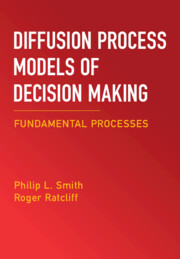
-
Select format
-
- Publisher:
- Cambridge University Press
- Publication date:
- 26 October 2025
- 13 November 2025
- ISBN:
- 9781009652667
- 9781009652681
- 9781009652698
- Dimensions:
- (254 x 178 mm)
- Weight & Pages:
- 1.284kg, 552 Pages
- Dimensions:
- (254 x 178 mm)
- Weight & Pages:
- 1.018kg, 552 Pages
You may already have access via personal or institutional login
Book description
Diffusion decision models are widely used to characterize the cognitive and neural processes involved in making rapid decisions about objects and events in the environment. These decisions, which are made hundreds of times a day without prolonged deliberation, include recognition of people and things as well as real-time decisions made while walking or driving. Diffusion models assume that the processes involved in making such decisions are noisy and variable and that noisy evidence is accumulated until there is enough for a decision. This volume provides the first comprehensive treatment of the theory, mathematical foundations, numerical methods, and empirical applications of diffusion process models in psychology and neuroscience. In addition to the standard Wiener diffusion model, readers will find a detailed, unified treatment of the cognitive theory and the neural foundations of a variety of dynamic diffusion process models of two-choice, multiple choice, and continuous outcome decisions.
Reviews
'This is the first volume of a pair that will become the definitive books on diffusion process models of decision making. This book provides an outstanding introduction to the theory, both clear and rigorous, written by the leading experts in the field. A ‘must buy' for every decision scientist.'
Jerome Busemeyer - Distinguished Professor of Psychological and Brain Sciences, Indiana University Bloomington
‘Philip Smith and Roger Ratcliff are the leading world researchers on evidence accumulation modeling, and have produced a definitive survey of the many variants of diffusion models and their respective merits. Every researcher in every field who would like to explain their response time and accuracy data with an evidence accumulation process should have this book on their shelves, and use it extensively.'
Richard Shiffrin - Distinguished and Luther Dana Waterman Professor, Indiana University Bloomington
‘This two-volume set on what is arguably the most compelling account of human information processing is an instant classic that will prove to be an indispensable guide for future generations of cognitive scientists. It is an absolute triumph.'
Eric-Jan Wagenmakers - Professor at the Department of Psychological Methods, University of Amsterdam
‘With diffusion process models becoming one of the most developed and applied approaches for decision making in psychology and beyond, this book, the first of two, is highly welcome as a textbook for students and a reference for experienced researchers. It is written by leading scholars in the field and lays the foundations for applying sequential sampling models to psychophysical tasks and to neuroscience.’
Adele Diederich - Professor of Psychology, Carl von Ossietzky University Oldenburg
Contents
Metrics
Full text views
Full text views help Loading metrics...
Loading metrics...
* Views captured on Cambridge Core between #date#. This data will be updated every 24 hours.
Usage data cannot currently be displayed.
Accessibility standard: Unknown
Why this information is here
This section outlines the accessibility features of this content - including support for screen readers, full keyboard navigation and high-contrast display options. This may not be relevant for you.
Accessibility Information
Accessibility compliance for the PDF of this book is currently unknown and may be updated in the future.

